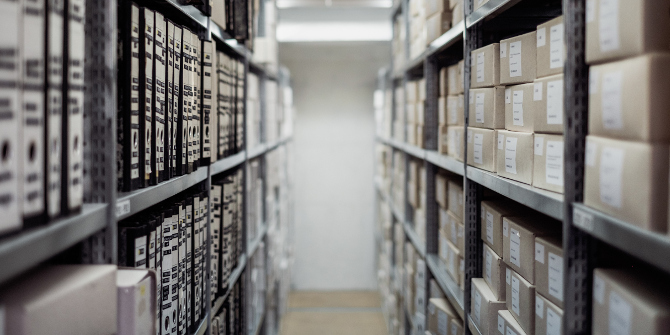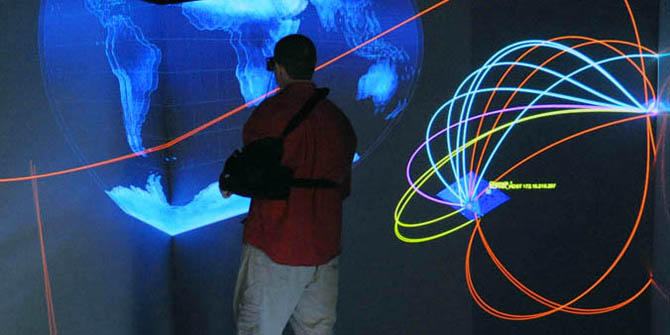 By placing archives under direct control of the executive and creating retroactive rules to define the historical, Mexico’s proposed General Law on Archives could damage academic, journalistic, and popular access to collective memory, writes Alejandro de Coss Corzo (LSE Sociology).
By placing archives under direct control of the executive and creating retroactive rules to define the historical, Mexico’s proposed General Law on Archives could damage academic, journalistic, and popular access to collective memory, writes Alejandro de Coss Corzo (LSE Sociology).
Historical archives are inevitably shaped by politics and law. But by redefining what is historical and placing archives under political control, Mexico’s new General Law on Archives would have unusually direct and damaging consequences on research, journalism, and transparency.

For now the law remains at the proposal stage, having been introduced in November 2016 by the ruling Institutional Revolution Party (PRI), the centre-left Party of the Democratic Revolution (PRD), and the centre-right National Action Party (PAN), which had formed legislative coalition for the first three years of the current parliament. While there is widespread agreement amongst journalists, academics, and citizens about the need for new legislation in this area, the proposal as it stands has two particularly problematic aspects.
First, it places the National Archives System under direct control of the executive, raising fears of political manipulation of history. Second, it proposes to create retroactive rules to determine what is deemed historical and therefore what is to be erased or preserved.
Historical archives and research in the social sciences
Historical archives are key in much social-science research. The information they hold is vital to the work of historians, sociologists, and political scientists, amongst many others. But more broadly they are places where the general public can access the past, whether to uncover the history of their family, their street, their community, or their society. Archives are part of our collective memory.
But the information they hold is not pure, raw history, waiting to be discovered. Rather, their contents reflect the way they’re managed, which is subject to political, legal, and administrative choices. Archives can easily lack certain information due to deliberate political decisions or as a by-product of poor archiving regulations and practices.
A brief example from my own research into Mexico’s water system might help to illustrate this. In Mexico City’s Historical Archive, documents created during the construction of Mexico City from the now defunct Secretariat for Public Works are not well ordered. Large boxes contain diverse information, organised with no obvious logic. One file might contain documents dealing with waterworks, roadworks, and commissions to build parks and erect statues.
There are numerous possible causes for this. It is possible that the Secretariat had no internal rules on archival work and was effectively filing all of its different activities under the same categories. The Mexico City Historical Archive may not have had specific directives on how to process this information when it was first filed. It could also be that officials at the Secretariat exploited the lack of clear laws and transparency to make potentially controversial files disappear.
The resulting gaps are a potential problem not only for social-scientific and historical research, but also for political and territorial communities trying to understand where they came from and how that has shaped who they are today.

The potential effects of Mexico’s new General Law on Archives
The new General Law on Archives could serve to legitimise and institutionalise precisely these kinds of gaps in our collective memory. The proposal, which has drawn criticism from various quarters, has numerous characteristics that jeopardise the future of historical archives in the country.
The first problem is that the executive would be able to exert control over the process of filing historical documents. Particularly concerning is the fact that head of the National Archives System, the body responsible for deciding what is history and what is not, would be appointed by the president. The system would also be managed by a National Council, chaired by the Minister of the Interior along with other officials, most of whom are appointed directly by the president.
Aside from their susceptibility to political influence, these officials may not have the necessary experience to make highly technical decisions regarding the administration, categorisation, and use of historical archives. This raises the spectre of the historical being defined in terms of the interests of those in power.
Also controversial is the possibility of retroactively re-evaluating the historical worth of any given document. The proposed law states that all historical archives must analyse documents filed before the law was approved in order to judge whether they are historical or not. The criteria, however, are extremely imprecise, leaving ample space for interpretation by the national authorities. Since the National Council and the National Archives System would be under governmental control, this could provide a means of obscuring or even erasing the past in order to maintain present injustices and to guarantee the impunity of those guilty of crimes past and present.
Archives, collective memory, and contemporary Mexico
Another group that has taken the lead in opposing this new law is journalists. The current Mexican government faces numerous accusations regarding its human rights record, its potential role in region-wide corruption schemes, and the protection of crooked politicians, meaning that the consequences of politically controlled archives go far beyond the limits of social science, potentially impacting even the future of democracy and justice in Mexico.
Of particular concern is one severe directive of the new law that allows for the protection of personal data. In controversial cases – the criteria for applicability of this directive are unspecified – the details of the people involved could be erased from newly archived material in the name of personal-data protection, all under control of the government.
Apart from preventing contemporary scrutiny, this will hamper understanding social-scientific analysis of historical social processes. The particular actors that shape society matter, and knowing their names, their connections, and the details of their interactions can be crucial in understanding how particular events unfolded.
A new law, but not this one
There is scope to improve on Mexico’s current law on archives, but this should be done hand-in-hand with civil society and the research community. If the proposed law is approved as it stands, research, journalism, political activism, and public access to history will pay the price.
We could be left unable to reconstruct history, which is contained both in the files themselves and embedded in the administrative logic of the archives that house them. Any attack on Mexico’s collective memory hurts not only Mexican citizens like myself, but also all those around the world who study and research our country. Just as memory is collective, so too must be its defence.
Notes:
• The views expressed here are of the authors rather than the Centre or the LSE
• Please read our Comments Policy before commenting






Hi Alejandro! Thanks for this great commentary – do these criticisms remain true with the law approved by the Camara de Diputados in April 2018? Or were changes made within the year to appease the academic community?
Thanks in advance.